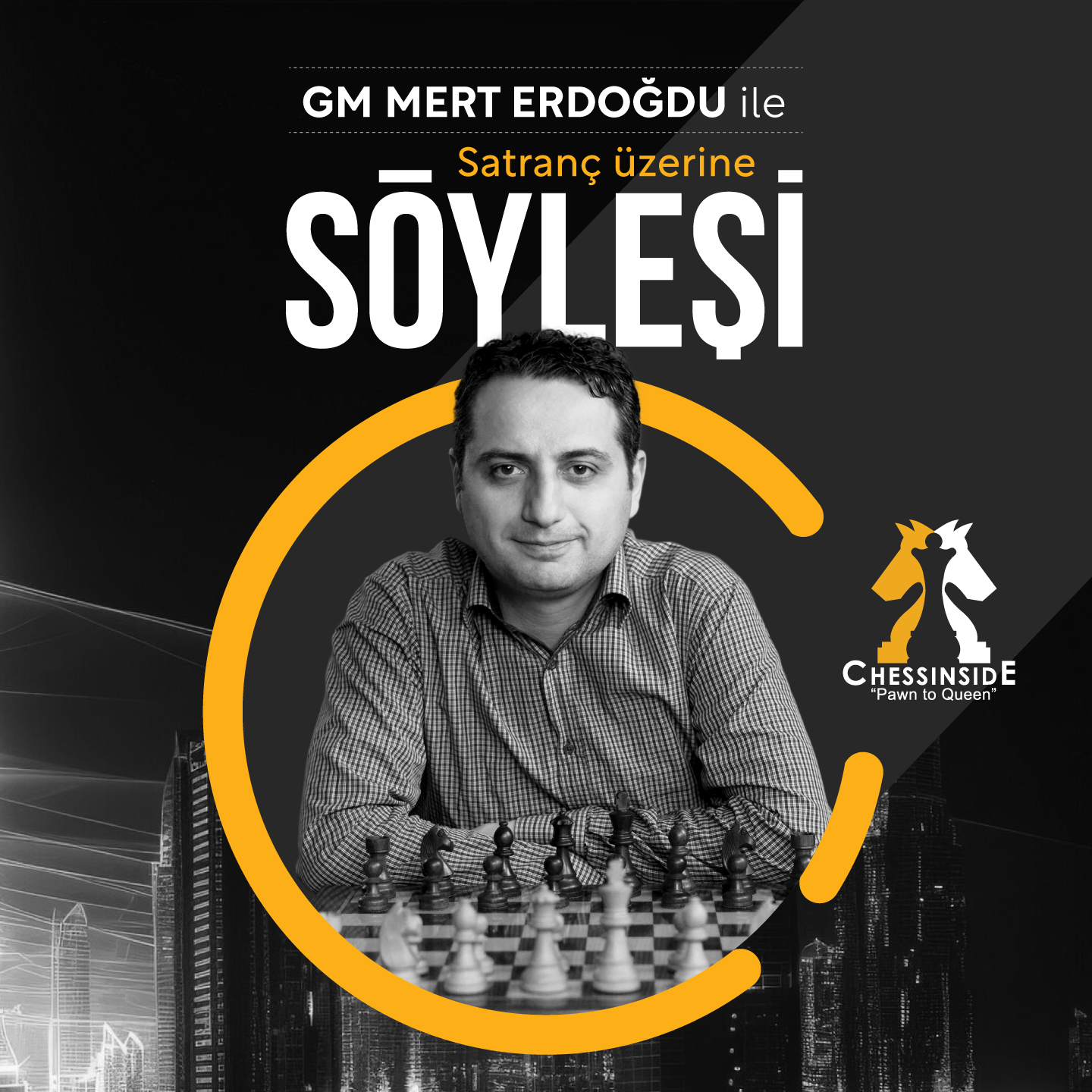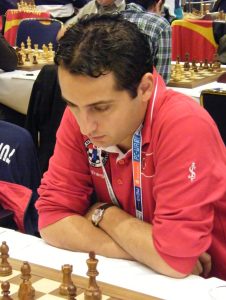Hello Mr. Mert, first of all, thank you very much for taking your time and accepting our invitation.
You’re welcome. Always, with pleasure.
How did you start playing chess?
When I was a boarding student at Galatasaray High School, we couldn’t play football on rainy days, so we used to crowd into the chess room with my schoolmates. I had some chess acquaintances from those days. After a long break, I played again with one of my friends with whom I used to play head-to-head. He easily beat me. I couldn’t take it in my stride and started to read Selim Palavan’s book named “Chess”. The more I read, my curiosity grew and I decided that I would like to play chess.
In 2001 you were awarded the FM title and in 2003 the International Master title. Shortly after becoming the Turkish Champion, you won the Grandmaster title. What would you like to say about the process of becoming a Grandmaster?
In 2000, at the Chess Olympiad in Istanbul, I made my debut in the national team and played on the first table of the national team B. I played in the national team until 2010 (except for the 2006 Turin Olympics). In 2006, the idea of becoming a grandmaster started to take shape in my mind when we had a regular coach for the first time. In 2009, I finally started to play chess at the level I wanted, achieving two consecutive GM norms. However, I was deeply affected by my poor performance at the World Team Championships in Bursa in 2010, just as I had reached my highest rating. Then my decline period began. When I lost 100 elo points, the federation withdrew its support. That’s why I focused on coaching, but getting my final norm was a goal I always wanted to achieve. When I had a regular income, I started to work by investing in chess to achieve my goal. When my son Erim was born in 2016, I achieved my goals in chess by becoming Turkey Champion first and then becoming a Grandmaster in 2017.
Did you have any role models who contributed to your improvement in this process and whom you felt close to yourself?
Kasparov was my idol with his incredible determination and fighting spirit. Whenever I felt lazy, remembering Kasparov’s work discipline was always a strong motivation.
Many chess players are interested in sports other than chess to keep fit, are you interested in any other sports??
I love playing table tennis but it’s not always easy to find good players. The only sports activity I have been doing lately is long walks. And unfortunately, it’s not regular.
What do you do before a match? Do you have any routine to motivate yourself?
A good sleep is one of the best preparations for me. I try to siesta with a coffee nap before the second round, especially on double-round days. And for motivation, I like to listen to Bohemian Rhapsody loudly before leaving the room.
How do you eat during a tournament?
I try to eat as healthy as possible during a tournament. I eat two hours before the round and eat nuts during the round, depending on the situation.
You mentioned that you focused on coaching after becoming an IM, who are the successful students you have worked with so far?
Currently, the best ones are GM Yagiz Kaan Erdogmuş and IM Isik Can. We have been working very intensively with Yagiz recently. We had worked with Işık Can during his development period. I must mention that I have some talented students who have become Turkish Champions: Siar Yaran, Kaan Can, Utku Uzumcu, Isil Can, Azra Ece Koc, Deniz Firat. I hope there are no other Turkish Champions that I have forgotten.
There are a few names you may have forgotten who have done well in the World and European Schools Championships.
I think I know who you are referring to. Yes, I have other students like Görkem Ünsal whom I worked with before the Turkish Championship, but I don’t think it is right to share them, because apart from my private lessons, he also worked with Barış (GM B.Esen) and you (Ozan Öz) and other coaches. Other players, with whom I only had group lessons, should be remembered by their coaches with whom they worked one-on-one for many years.
It’s a sensitivity that needs to be exemplified. And what do you think are the three main common traits of successful players when you look back over your coaching history of more than 20 years?
The first common traits that come to my mind are the love of chess and the determination to work. Let me tell you an anecdote: We were together with Yağız until the morning of the day he was going to the Sardinia Tournament. He had to leave at 6:00 a.m., so he didn’t want to sleep. Around 03:30 he said to me, “Coach, people always ask me what are you doing to be so good. We two Grandmasters are still working at 3:30 in the morning. Nobody sees that.” A great lesson from a 12-year-old boy, for those who want to take.
Can we say that the third trait is conscious parents?
Bravo. That’s a good point. Definitely, we can.
You defeated Magnus Carlsen, one of the greatest chess players of all time and a multiple World Champion, in an online game. How did you feel?
In the opening, he preferred a mocking approach, underestimating his opponent. No matter who he is, one should not underestimate the opponent. Otherwise the unexpected can happen. I’m glad I reminded him of that.
As you know, when we organize an opening camp as Chessinside, we face a lot of interest and we have had to open additional quotas. But we don’t see the same interest in other parts of the game. What is the importance of opening especially under 2000 elo?
I liken the openings to the armor of medieval knights. It is very important for a player, but the man in that armor must also be strong. Even if you give the world’s strongest and shiniest armor to a frail, weak person, it doesn’t matter if he can’t lift the sword. That’s why a player must first strengthen the man in the armor. You can fight without armor, but if you have no strength, no armor can save you.
Some players have been practicing chess for many years but they don’t make any progress. What do you think is the biggest mistake they make?
The most important way to progress in chess is to do everything in a balanced and planned way. You can’t improve just by practicing, and you can’t improve just by playing. Also, it’s more important how you practice rather than how hard you practice.
At this point, I recommend that they work with a good coach. One of the biggest contributions of coaches is to prevent the player from wasting time on the wrong paths and to use this time efficiently.
With your current mindset, how would you train yourself if you were the trainer of your 10-year-old version and you had a 1000-hour work limit?
First I turn myself into a calculator. In the beginning, I spend my time doing 800 hours of calculating power, 150 hours of endgame, and 50 hours of openings and strategy. Then I update the hours according to my deficiencies.
Could you elaborate on why you made this choice?
It is impossible to be a good chess player without being able to calculate. In addition, when you look at the games in the database, it is clear that the main factor that determines the fate of the game is calculation errors as the elo score decreases. That’s why I put calculation first.
Let’s elaborate on the situation with a car metaphor.
Think of the chess player as the driver and the speed of the car as the calculation power. If the calculation power is weak, the player will either run out of time while thinking or get into a zeitnot (time pressure) and make big mistakes. By car, you can travel 10 hours slowly in three days, but it’s not possible in tournaments. Isn’t it? You need to calculate both quickly and accurately.
Of course, the strategy part should not be skipped. Because your destination could be a cliff. In that case, there is no point in moving fast. In other words, the player must have the chess understanding to correctly determine the position he wants to reach. If he doesn’t know which piece to leave on the board and which piece to cut, if he is strategically lost in his target position, it doesn’t matter if he calculates it in a second.
In 2021, you accepted a coaching offer from the United Arab Emirates and made a brain drain. What are the main differences when you compare UAE and Turkish chess? What do you see for Turkish chess in the future?
Turkey is now a chess country. After the breakthroughs in the 2000s, chess has become a way of life and livelihood in Turkey, despite not being managed well. That’s why we have become one of the most important chess countries in the world by producing more and more successful players.
The system here is quite different from what we are familiar with. The UAE is currently in the process of introducing chess into schools. I hope it will gradually progress here as well.
With unlimited opportunities, what kind of utopia would you create if you were TSF President?
In my opinion, the federation has two missions.
The first is to create strong clubs.
It creates a healthy competitive environment when clubs are self-sufficient and raise good players. A healthy competitive environment will obviously move the country’s chess forward.
The second is to create resources for these clubs by finding more sponsors.
In fact, these are simple things that would come to the minds of anyone who is in this field and wants to do the right things.
Finally, what would you like to say to chess lovers who are dedicated to this sport?
I wish chess lovers a lot of fun. I would like to remind our young people who want to improve themselves that there is nothing that cannot be achieved after working hard, and to keep their goals high.





